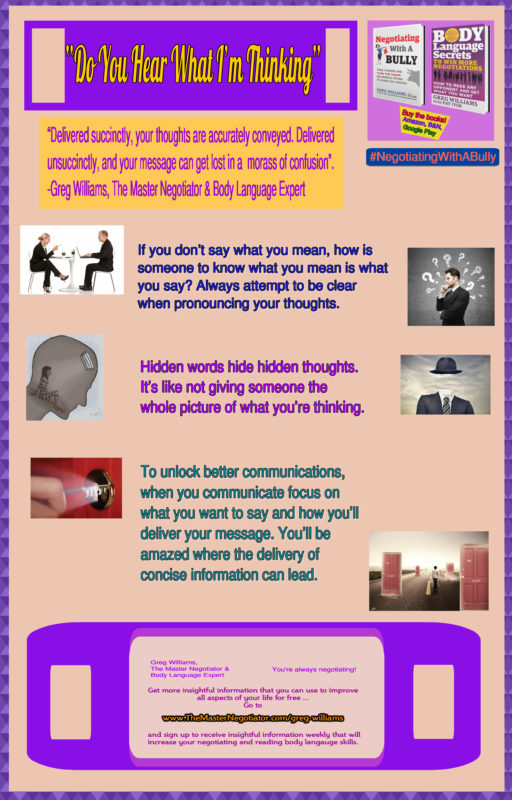Do You Hear What I’m Thinking?
Do You Hear What I’m Thinking? https://csuiteold.c-suitenetwork.com/advisors/wp-content/themes/csadvisore/images/empty/thumbnail.jpg 150 150 Greg Williams, MN, CSP https://secure.gravatar.com/avatar/1f08a50bcaed92eae0990a65c7808a62?s=96&d=mm&r=g
“Delivered succinctly, your thoughts are accurately conveyed. Delivered unsuccinctly, and your message can get lost in a morass of confusion”. -Greg Williams, The Master Negotiator & Body Language Expert
How many times do you catch yourself not saying exactly what you’re thinking? You say one thing and the meaning becomes altered by what you emit. Okay, did you catch that? The intent was to state, … by what you omit. Such nuances can leave the receiver of your message confused about its intent. We omit complete thoughts at times because we’re not focused on what we say or write.
The following are two points to consider before communicating with others. They’ll help you communicate more effectively.
Know your environments.
Some people get tongue-tied due to their environment. They experience self-pressure because they want to perform better. That’s usually due to how they think they’ll be perceived versus how they wish it to be. Recognize that something is occurring that makes you feel unsafe in those environments. It may stem from the people in it or the environment itself (i.e. glitzy, downtrodden, etc.).
Prior to your entry, identify how you want to convey your thoughts, what might prevent you from doing so, and what you’ll do to become unstuck if that occurs. Having plans in place to move from one mental environment to another will allow you the mental dexterity to place your mind at ease and focus on the message you want to deliver.
Know your mental peaks.
Everyone has times in the day when they’re more mentally alert. Do you know yours? More importantly, do you know what times are best for the important communications that you’ll have?
When you’re at the ‘top of your game’ note how you got there. Is it something someone says that ignites it? Was it the exercise regimen you engaged in. Was it due to a lack of fatigue? Knowing the answers to these questions and others will allow you to identify when you’ll most likely be at your mental peak. When possible, choose those times to engage in more important communications.
When you communicate, whether in writing or verbal, there’ll be times when you don’t communicate succinctly. The better you become at identifying those times, the more alert you’ll be about their occurrence. That mindfulness should allow you to prepare better for the encounter, which should allow you to communicate better … and everything will be right with the world.
What does this have to do with negotiations?
Every negotiation involves communications. It’s in the form of what you say and how you say it. Thus, as offers and counteroffers are exchanged, the words used to convey their sentiment impacts the perception of the offer. Therefore, if you don’t represent your thoughts appropriately, you’ll decrease the chance of communicating effectively. That can lead to a hellish negotiation.
In every negotiation, plan what you’ll say and the body language you’ll use when imparting your message (e.g. moving closer when offers are appealing – away when they’re not, hand supporting chin to reflect contemplation, hands pushing away to signal disdain for the offer, etc.). The more aligned your body language is with your message, the more your message will appear believable. Even if your full thought isn’t conveyed, the body language that accompanies it will add an extra dimension to the message.
Remember, you’re always negotiating!
After reading this article, what are you thinking? I’d really like to know. Reach me at Greg@TheMasterNegotiator.com
To receive Greg’s free “Negotiation Tip of the Week” and the “Sunday Negotiation Insight” click here http://www.themasternegotiator.com/greg-williams/
#Communication #Success #Emotion #Business #Progress #SmallBusiness #Negotiation #NegotiatingWithABully #Power #Perception #emotionalcontrol #relationships #HowToNegotiateBetter #CSuite #TheMasterNegotiator #ControlEmotions

